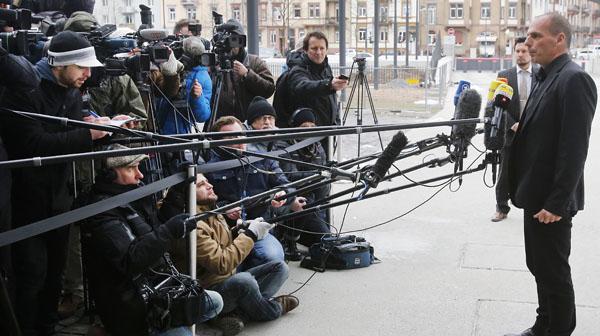You are here
No more orders or austerity from Europe, Greek PM says
By Agencies - Feb 05,2015 - Last updated at Feb 05,2015
ATHENS — Greek Prime Minister Alexis Tsipras tore into his European Union (EU) allies on Thursday, pledging to "put an end once and for all" to the EU's austerity policies.
In a defiant first speech to his left-wing parliamentary group after returning empty-handed from a European tour, Tsipras said Athens was no longer open to being told what to do.
"Greece won't take orders any more, especially orders through emails," he stressed. "Greece is no longer the miserable partner who listens to lectures to do its homework. Greece has its own voice."
In an apparent reference to the tough stance taken by the European Central Bank (ECB) and others, Tspiras said: "Greece cannot be blackmailed because democracy in Europe cannot be blackmailed."
Tsipras and his Finance Minister, Yanis Varoufakis, have been crisscrossing Europe to win support from partners for their plan to win debt relief and end austerity policies but have so far received little other than warnings to avoid reneging on commitments under the country's existing bailout programme.
But they have received little if any concrete support.
"We did not even agree to disagree", Varoufakis said on Thursday after a meeting with German Finance Minister Wolfgang Schaeuble, actually contradicting his host.
Tsipras, however, said he did not return from the trip without anything to show for it.
"In only a week, we won allies that we haven't won in the last five years of the crisis," he said.
The maiden meeting between Greece's iconoclastic new finance minister from the Marxist left and his 72-year-old conservative German nemesis was never going to be easy. It turned out even worse than expected.
Varoufakis, notoriously casual in his dress, wore a dark shirt and jacket but no tie to meet the veteran Schaeuble. Not only did they look awkward together, they could not even agree on how much they had disagreed.
The German minister glared stony-faced through their joint news conference. Outside, a few dozen unionists and supporters of Germany's Left party, which backs Tsipras' far-left Syriza, held banners saying: "Mr Schaeuble, stop strangling Greece!"
Schaeuble, whose passion for European integration is second only to his zeal for balanced budgets, said they had agreed to disagree. He was promptly contradicted by his younger visitor, who spoke in English.
"We didn't reach an agreement. It was never on the cards that we would. We didn't even agree to disagree, from where I am standing," said Varoufakis, a 53-year-old economist and blogger.
Schaeuble looked particularly uncomfortable when Varoufakis referred to Germany's Nazi past, which some Greek anti-austerity protesters have recalled by lampooning Merkel in a Nazi uniform.
Germany should understand Greece because its own depression in the early 20th century gave rise to the Nazis and now "Nazism is rearing its ugly head in Greece", said Varoufakis, apparently referring to the far-right Greek political party Golden Dawn.
Newspaper cartoonists have depicted the clash of ideologies as an unstoppable force, Tsipras and his Syriza party, meeting an immovable object, in the form of Chancellor Angela Merkel's austere conservatives.
The two ministers did not discuss details of Greece's debt repayment schedule or the possibility of a debt "haircut", which Merkel and Schaeuble emphatically rule out. Varoufakis presented proposals for a "bridging programme" until May.
He tried to convince Germany, whose taxpayers are weary of funding bailouts for what they see as spendthrift southerners, the new Greek government would be a reliable partner, saying Berlin could expect "a frenzy of reasonableness" from Athens.
But he also made an emotional plea for Greece's partners to respect the outcome of its election, saying treaties must be upheld "without crushing the fragile flower of democracy with a sledgehammer", referring to criticism from German politicians.
"Schaeuble Brushes Off Greek Minister," was the verdict of Germany's top-selling daily Bild, which has been critical of Greece throughout the eurozone debt crisis.
Separately, the head of Germany's powerful Bundesbank warned Greece against using emergency funding to prop up its banks long-term and said countries must bear the impact of their decisions, further isolating Athens after it all but ditched a reform-for-aid deal.
Jens Weidmann's remarks follow the ECB's statement that it would no longer accept Greek government bonds as collateral for funding, shifting the burden onto Athens' central bank to finance its lenders.
The ECB's move means the Greek central bank will have to provide its banks with tens of billions of euros of additional emergency liquidity in the coming weeks.
However, Weidmann's remarks call into question Athens' freedom to use this emergency liquidity assistance (ELA). The ECB governing council can restrict such funding if a two-thirds majority agrees.
"ELA should only be awarded for the short term and to solvent banks," Weidmann, who also sits on the ECB's Governing Council of decision makers, told business daily Boersen Zeitung.
"As the banks and the state are closely bound in Greece, the economic and fiscal policy course that the Greek government follows plays an important role in this assessment," he said.
"Governments and parliaments must take decisions about whether and how to keep banks afloat, or wind them up," Weidmann added.
Speaking later in Venice, Weidmann upped the ante, demanding that countries bear the consequences of their own fiscal decisions and warning that any move to bail out a eurozone peer could lead to the spread of solvency doubts.
Singling out Greece's refusal to cooperate with the troika of inspectors from international lenders, he said there could be no sharing of fiscal responsibility without first ceding sovereignty.
"Member states remain fully responsible for the consequences of their own autonomous fiscal decisions," Weidmann said in Venice.
"If market participants tend to see the monetary union as a system of mutual financial assistance in the event of serious trouble, doubts about a country's solvency could spread more quickly to the other member states," he added.
By taking a tough line on Greece, the ECB is sending a signal that while it has repeatedly charged to the eurozone's rescue in the past, it is no longer willing to do governments' work for them, analysts said Thursday.
"The ECB has drawn a line. It is an attempt to remain independent," said Bert Van Roosebeke from the Centre for European Policy in Freiburg.
During the long years of crisis, the ECB has never hesitated to take on the role of firefighter, cutting its key interest rates time after time and taking a series of controversial and increasingly bolder unconventional policy decisions to prop up the eurozone economy.
Nevertheless, all through such action, ECB chief Mario Draghi has consistently argued that in order to solve the crisis, governments must get their finances and economies in order and not hide behind the ECB.
Hence, the ECB's announcement late Wednesday that it would no longer accept Greek government bonds, currently rated as junk, as collateral for loans would offer a taste of the ECB's bitter medicine, analysts said.
The ECB announcement came all the more as a surprise because it was issued just hours after Varoufakis had met Draghi in Frankfurt, talks which Varoufakis himself had described as "fruitful" and "encouraging".
But despite the immediate shock, analysts said there was no danger, at least for now, of Greek banks facing a liquidity crisis.
Greek debt has a junk credit rating and, under ECB rules, should not qualify as collateral for loans, anyway.
A special waiver to that rule, accorded to Greece as long as it was deemed to be in compliance with the terms of its 240-billion-euro ($270 billion) EU-International Monetary Fund (IMF) bailout, had been scheduled to expire on February 28.
So the ECB, which argued that it was "currently not possible to assume a successful conclusion of the programme review", had therefore merely pulled the plug two weeks earlier.
But it insisted that Greek banks still had other means of financing at their disposal, such as the ELA facility.
No liquidity crunch
Analysts were therefore confident that Greek banks would still be able to finance themselves.
"It is not likely that Greek banks will face immediate liquidity problems. Greek government debt can still be used to access ELA," said Natixis economist Jesus Castillo.
Greek banks had significantly reduced their holdings of government bonds and did not heavily rely on them as a source for collateral to secure ECB funding, anyway, the analyst noted.
Nevertheless, "the risk is that the ECB's decision will undermine the confidence in the Greek banks, which have already suffered significant deposit withdrawals before and after the January election," Castillo warned.
Outside ECB's remit?
Bruegel economist Silvia Merler was also concerned that "even if the liquidity consequences could be manageable, the political consequences could be less so”.
The move might "formally protect the ECB's independence, but it also forces the political game... well beyond the limit of a central bank's remit", she said.
Credit Agricole's Frederik Ducrozet saw the ECB decision as a "risky, albeit calculated political move (aimed at) pressuring the Greek government and eurozone policymakers to find an agreement within the next couple of weeks."
Berenberg Bank economist Christian Schulz said the ECB was sending "a strong signal. Instead of the ECB, the Bank of Greece and thus the Greek taxpayer will now be the lender of last resort for banks."
And the ECB decision had dealt a blow to Greece's negotiating position, Schulz said.
"Greece can hope for some face-saving compromises and modest adjustments at best, but not for a wholesale renegotiation of the adjustment programme," he added.
Related Articles
Fresh tensions emerged Thursday between Greece and Germany as attention turned to Athens's huge debt pile two days after the stricken eurozone country secured an extension of its bailout.
FRANKFURT () — Eurozone ministers approved the launch of Greece bailout talks and the European Central Bank (ECB) boosted its cash lifeline
Greece's new leftist government appealed to the European Central Bank (ECB) on Wednesday to keep its banks afloat as it seeks to negotiate debt relief with its eurozone partners, but Germany rejected any rollback of agreed austerity policies.

















